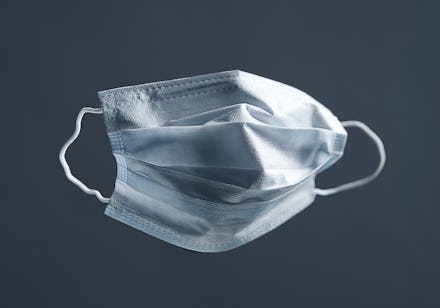What does 'containment' of coronavirus actually mean at this point?

As of this morning, there are 539 confirmed cases of coronavirus in the United States across 34 states, according to CNN. Some universities are closing as a result of the crisis and some culturally significant public gatherings, like South by Southwest, have been canceled. The US financial market has also been hit hard by the crisis. With all of the mounting evidence that COVID-19 is going to continue to impact the US, both in terms of health and finances, it’s getting hard not to panic. Here’s what you need to know, in practical terms, about how public health experts think we can both contain and mitigate coronavirus.
While several outlets are reporting that we’re past the point of containing this strain of coronavirus, it’s important to know that that doesn’t mean we’re screwed. Panic is the last thing we need, Bruce Aylward, a senior adviser to the director-general of the World Health Organization, suggested to NPR in an interview yesterday. Aylward just returned from a two-week trip to China where his team studied the on-the-ground data of the epidemic as it evolved. "They actually changed the course of a respiratory-borne outbreak without a vaccine, which was extraordinary," Aylward said to NPR. He believes that the US can learn from China’s containment approach, which took the daily cases of coronavirus down from 2,000 cases per day to under 100 cases per day in a matter of weeks.
While several outlets are reporting that we’re past the point of containing this strain of coronavirus, it’s important to know that that doesn’t mean we’re screwed.
Containment, according to NPR, means quickly identifying cases of coronavirus through testing, placing infected individuals in isolation, tracking who infected persons might have been in contact with and potentially quarantining those who came into contact with infection so that the disease doesn’t continue to spread. "As long as you have these discrete outbreaks ... there is the opportunity to control them — to get on top of these and contain them and prevent a lot of disease and ultimately death," Aylward told NPR.
Because the current epicenter of the disease in the United States is in the greater Seattle area, Aylward suggested that there is still potential for coronavirus to be contained, regardless of the issuing conflicting messages. This is leading Americans to wonder if we, too, should be on lockdown.
But, it is only in places where there was significant community outbreak that mass gatherings were prohibited in China, says Aylward, and the US should take note of this. "It wasn't a lockdown everywhere,” he told NPR, “That's the wrong way to portray China's approach to the disease.” Instead he says, we need to understand that emulating China’s successful approach to containing coronavirus means locking down only areas significantly affected, like Wuhan, following the disease as it develops, and building infrastructure to continue to contain the disease as necessary.
But US Surgeon General Jerome Adams said that because the cases of coronavirus are growing the US, we can no longer contain it that we should focus on mitigating, or lessening the impact, of the disease, reported the LA Times. Mitigation, Adams said, means that communities will now need to decide whether to close schools, cancel community gatherings, and keep people home from work, according to the LA Times. “Communities need to have that conversation and prepare for more cases so we can prevent more deaths,” he added.
In practical terms, containment means trying to confine coronavirus and mitigation means to try and lessen their spread and impact. It’s easy to get confused here, so to be clear, containment and mitigation are not oppositional approaches. Many public health experts agree that both containment and mitigation are necessary in the US, that we must both test for and track the virus as it develops and also prepare for the possibility of limited movement and increased spread. The CDC website says that most Americans are at low risk for infection and, in fact, has no posted guidelines for what individuals outside of viral hot zones or high risk healthcare workers should do.
Is the debate about how to contain coronavirus an indication that we should all be freaking out right now? Probably not. Our fears are valid but not the most helpful or constructive. And as we are seeing in Italy, fear itself can be a destructive force. We should probably all just wash our hands, stay as informed and responsible as possible, and try to stay chill.